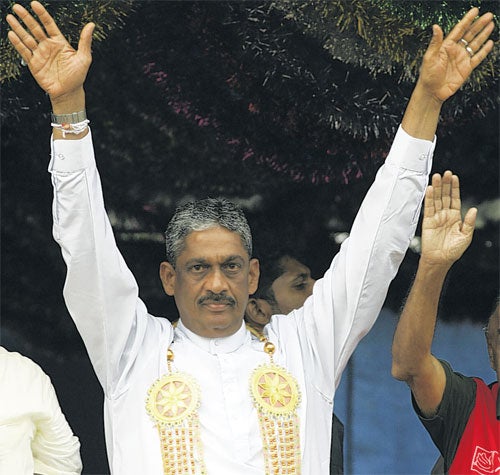Tamils throw weight behind general who crushed them
Tigers' political wing trying to oust incumbent president at January poll

Seven months after Sri Lanka's long and bitter civil war was brought to an end by a withering government assault, the political coalition that supported the Tamil Tigers has thrown its support behind the former army chief who crushed them.
In an ironic twist to the presidential election campaign being fought on the island, the Tamil National Alliance (TNA) announced yesterday that it was supporting General Sarath Fonseka in his bid to defeat President Mahinda Rajapaksa.
At a press conference in the capital, Colombo, the leader of the TNA parliamentary group, Rajavarothayam Sambanthan, said his group had decided to support Mr Fonseka's candidacy to prevent another victory by Mr Rajapaksa, whose poor record on human rights and law and order made it vital that he be beaten.
"The majority [of Tamils] are of the view that the only meaningful way in which the desire of President Mahinda Rajapaksa to seek a mandate for a further term may be thwarted is by voting for joint opposition candidate Sarath Fonseka," he said.
"Extrajudicial killings and enforced disappearances have been common, and the worst affected are Tamil people. Corruption is rampant, and consequently the rule of law and good governance have reached the nadir."
For all its apparent irony, the TNA's decision to support the controversial general in the election on 26 January was not entirely unexpected. Analysts say that many voters who may instinctively not wish to back the former army chief are likely to do so as a protest vote against the incumbent.
In November, Mr Fonseka announced he was stepping down from his post as head of the defence staff and soon afterwards it was revealed he had reached an agreement with the opposition coalition, headed by the United National Party (UNP), to stand as its candidate against Mr Rajapaksa.
The President and the general had once been close allies, but in the aftermath of the military operation against the Liberation Tigers of Tamil Eelam (LTTE), the military man was shifted sideways, prompting claims from Mr Fonseka that his role in the victory had not been sufficiently recognised. He later said that he was moved from his position as army chief because the President and his brother, Gotabhaya Rajapaksa, believed he was plotting a coup.
In an interview with a Sri Lankan paper published last month, Mr Fonseka also claimed that the President's brother had given orders that all the LTTE leadership be killed, even though some of them were seeking to surrender as government troops marched into their final stronghold last May. Perhaps conscious of a possible backlash, he later retracted the claim, saying he had been misquoted.
The increasingly heated election contest has split the support of the Sinhalese Buddhist establishment but Mr Fonseka has sought to position himself as candidate for minorities as well. Having previously claimed that Tamils should not receive the same rights as the Sinhalese majority, he has increasingly moderated his position and talked of equality, human rights and justice.
Over the weekend, with the campaign gathering pace, the former general toured the formerly rebel-held Jaffna Peninsula and said he would create an environment that encouraged business, relax security measures and return land seized by the military. He also said he would release hundreds of Tamil youths held on suspicion of having links to the rebels and offer amnesty and rehabilitation to hardcore fighters.
Making up 12 per cent of the population, Tamils represent an important electoral bloc and the UNP opposition coalition has been seeking to reach out to the TNA, which currently holds 22 seats in Sri Lanka's 225-member parliament.
"If the Tamils don't support Fonseka, then their vote is lost. It's more like a protest vote against Rajapaksa getting back into power," said one Colombo-based analyst who asked not to be identified. "In the 2005 election, there was a boycott by the Tamils. Had they taken part then Rajapaksa would not have won."
At yesterday's press conference, Mr Sambanthan did not comment on Mr Fonseka's role in the alleged abuse that is said to have taken place during the closing stages of the war, when the UN estimates up to 10,000 Tamil civilians were killed.
However, he said his party talked with both candidates about issues that were of importance to Tamils, such as the resettlement of some 300,000 civilians displaced by the war, the rehabilitation of areas destroyed by the fighting and the dismantling of so-called high-security zones in Tamil areas.
Join our commenting forum
Join thought-provoking conversations, follow other Independent readers and see their replies
Comments
Bookmark popover
Removed from bookmarks